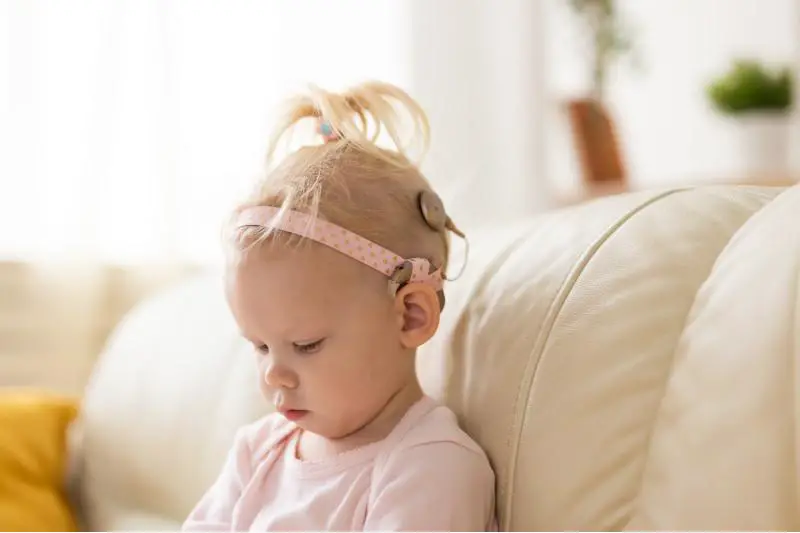Introduction
Hearing loss in children can be a difficult and overwhelming topic for parents to understand. It can be hard to know what causes it, what the symptoms are, and what treatment options are available. This guide is here to help you understand everything you need to know about hearing loss in children, from causes to treatments and everything in between.
Causes of Hearing Loss in Children:
There are many different things that can cause hearing loss in children. Some of the most common causes include genetics, infections, injuries, and exposure to loud noises. In some cases, hearing loss is present at birth and is called congenital hearing loss. This can be caused by a variety of factors, including genetics and certain infections during pregnancy.
Symptoms of Hearing Loss in Children:
Hearing loss in children can be difficult to spot, as many children may not be able to communicate that they are having trouble hearing. Some common signs of hearing loss in children include not responding to loud noises, not being able to understand speech, and difficulty following instructions. It is important to have your child’s hearing tested if you suspect they may have hearing loss.
Treatments for Hearing Loss in Children:
There are many different treatment options available for hearing loss in children. Some common treatments include hearing aids, cochlear implants, and speech therapy. The best treatment option for your child will depend on the type and severity of their hearing loss. Your pediatrician or an audiologist can help you determine the best course of treatment for your child.
Types of Hearing Loss in Children:
There are two main types of hearing loss in children: conductive and sensorineural. Conductive hearing loss occurs when there is a problem with the outer or middle ear, such as fluid in the ear or a blockage. Sensorineural hearing loss occurs when there is damage to the inner ear or the nerve that carries sound to the brain. It can be caused by a variety of factors, including genetics, infections, and exposure to loud noises.
Overall, hearing loss in children can be a complex and challenging issue, but it is important to remember that there are many resources and treatment options available. With the right support and solutions, children with hearing loss can lead fulfilling and successful lives.
congenital hearing loss is the impact it can have on a child’s communication, cognitive, social, and emotional development

Types of Hearing Loss in Children
There are two main types of hearing loss in children: conductive and sensorineural. Understanding the difference between these two types of hearing loss is important in order to provide the appropriate care and treatment for your child.
Conductive hearing loss occurs when there is a problem with the outer or middle ear, such as fluid in the ear or a blockage. This type of hearing loss can often be treated with medication, ear tubes, or surgery. Some common causes of conductive hearing loss in children include ear infections, middle ear fluid, and earwax build-up.
Sensorineural hearing loss occurs when there is damage to the inner ear or the nerve that carries sound to the brain. This type of hearing loss is usually permanent and can be caused by a variety of factors, including genetics, infections, and exposure to loud noises. Sensorineural hearing loss can be treated with hearing aids or cochlear implants.
Another type of hearing loss is mixed hearing loss, which is a combination of conductive and sensorineural hearing loss. It is a result of both an inner or nerve problem as well as a problem in the middle or outer ear. This type of hearing loss can be treated with a combination of medications, surgery, and hearing aids.
It is important to note that there are different degrees of hearing loss, and the severity of the loss will determine the appropriate treatment options. A hearing test can help determine the type and severity of hearing loss and recommend the appropriate solution. It is important to work with an audiologist or a paediatrician to ensure that your child receives the best possible care.
Symptoms of Hearing Loss in Children
Symptoms of hearing loss in children can be difficult to spot, as many children may not be able to communicate that they are having trouble hearing. However, there are some common signs that parents and caregivers can look out for.
One of the most common symptoms of hearing loss in children is not responding to loud noises. This can include not turning their head or looking towards a noise, not waking up to loud sounds, or not being startled by loud noises.
Another symptom of hearing loss in children is difficulty understanding speech. This can include not responding to their name, not being able to follow simple instructions, or not being able to understand what is being said to them.
Some other symptoms of hearing loss in children can include difficulty hearing certain sounds, such as high-pitched sounds like birds singing, difficulty with speech development, or avoiding social situations. It is important to have your child’s hearing tested if you suspect they may have hearing loss.
It is important to note that children with hearing loss may not exhibit all of these symptoms and may not show signs of hearing loss all the time, especially when the loss is mild. Therefore, it is crucial to get your child’s hearing checked regularly, especially if you suspect any hearing loss. A hearing test can help determine if there is a problem and recommend the appropriate solution.

There are two main types of congenital hearing loss: sensorineural and conductive.
Congenital Hearing Loss: A Comprehensive Guide to Unlock the Secrets
Welcome to “Congenital Hearing Loss: A Comprehensive Guide to Unlock the Secrets”! This guide will help you understand everything you need to know about congenital hearing loss and how it can impact a child’s development.
Causes of Hearing Loss in Children
Hearing loss in children can be caused by a variety of factors. Some of the most common causes include genetics, infections, injuries, and exposure to loud noises. Understanding the causes of hearing loss in children is important in order to prevent and treat the condition.
One of the most common causes of hearing loss in children is genetics. Some children are born with hearing loss due to a genetic condition or an inherited trait. This type of hearing loss is called congenital hearing loss and can be caused by a variety of factors, including genetics and certain infections during pregnancy.
Infections are another common cause of hearing loss in children. Ear infections, such as otitis media, can cause fluid buildup in the middle ear, which can lead to hearing loss. Meningitis and measles are other infections that can cause hearing loss.
Injuries can also cause hearing loss in children. Head injuries, such as a skull fracture or traumatic brain injury, can damage the ear and lead to hearing loss. Noise-induced hearing loss can be caused by exposure to loud noises, such as loud music, fireworks, or power tools.
Exposure to loud noise over time, even at low levels, can damage the delicate hair cells in the inner ear that are responsible for hearing. This type of hearing loss is called Noise-induced hearing loss (NIHL) and is preventable. It is important for parents and caregivers to monitor their children’s exposure to loud noises and take steps to protect their hearing.
It is also important to note that hearing loss can be caused by a combination of factors and may not have a single clear cause. Regular hearing tests can help detect hearing loss early and prevent further damage. Parents and caregivers should be aware of the symptoms of hearing loss and seek medical advice if they suspect their child may have hearing loss.
Treatments for Hearing Loss in Children
Treatments for hearing loss in children vary depending on the type and severity of the hearing loss. It’s important for parents and caregivers to work with pediatricians or audiologists to determine the best course of treatment for their child.
One of the most common treatments for hearing loss in children is the use of hearing aids. Hearing aids amplify sounds so that they can be heard more clearly. There are many different types of hearing aids available, and the best option for your child will depend on their specific needs.
Another treatment option for hearing loss in children is the use of cochlear implants. Cochlear implants are a type of device that can be surgically implanted in the ear to help children with severe or profound hearing loss. They work by converting sounds into electrical signals that are sent directly to the brain.
Speech therapy is another treatment option for children with hearing loss. Speech therapy can help children develop their communication skills and improve their ability to understand and use speech.
In addition to these treatments, certain medications can be used to help with hearing loss. For example, antibiotics can be used to treat ear infections, and diuretics can be used to reduce fluid in the ear. Surgery may also be an option for some children with conductive hearing loss.
It is important to note that the best course of treatment for a child with hearing loss will depend on the specific type and cause of the loss. Treatment options may be different for children with congenital hearing loss, acquired hearing loss, or noise-induced hearing loss. Regular hearing tests and close monitoring can help ensure that the child receives the appropriate treatment for their hearing loss.
The Signs of Hearing Loss in Children – How to Detect It Early
It’s important to be aware of the signs of hearing loss in children, as early detection is key to helping them develop properly.
Early intervention – Hearing Loss in Children
Early intervention is crucial for children with hearing loss. It can help children develop their communication skills and prevent delays in their speech and language development. Early intervention can also help children with hearing loss succeed in school and in social situations.
The earlier hearing loss is detected, the better the outcome will be for the child. Children with hearing loss should be identified as early as possible and provided with appropriate support and services. This can include regular hearing tests, speech therapy, and other forms of support.
Early intervention services can include a range of different therapies, such as speech and language therapy, audiology, and educational support. Speech therapy can help children with hearing loss develop their communication skills and improve their ability to understand and use speech. Audiology can help children with hearing loss access appropriate devices such as hearing aids or cochlear implants. Educational support can help children with hearing loss succeed in school and in social situations.
Early intervention can also involve working with parents and caregivers to help them understand and support their child’s hearing loss. This can include providing information and resources, teaching strategies for communication and language development, and connecting families with support groups and other resources.
Overall, early intervention is essential for children with hearing loss. It can help children develop their communication skills and succeed in school and in social situations. It can also help parents and caregivers understand and support their child’s hearing loss. With the right support and resources, children with hearing loss can lead fulfilling and successful lives.
Conclusion
Hearing loss in children can be a difficult and overwhelming topic for parents and caregivers to understand. However, with the right information and resources, children with hearing loss can lead fulfilling and successful lives. This guide has provided an overview of the causes, symptoms, treatments, and types of hearing loss in children, as well as the importance of early intervention.
Causes of Hearing Loss in Children:
We have seen that there are many different things that can cause hearing loss in children. Some of the most common causes include genetics, infections, injuries, and exposure to loud noises. In some cases, hearing loss is present at birth and is called congenital hearing loss. This can be caused by a variety of factors, including genetics and certain infections during pregnancy. It is important to note that hearing loss can be caused by a combination of factors and may not have a single clear cause. Regular hearing tests can help detect hearing loss early and prevent further damage.
Symptoms of Hearing Loss in Children:
We have also seen that symptoms of hearing loss in children can be difficult to spot, as many children may not be able to communicate that they are having trouble hearing. Some common signs of hearing loss in children include not responding to loud noises, not being able to understand speech, and difficulty following instructions. It is important to have your child’s hearing tested if you suspect they may have hearing loss.
Treatments for Hearing Loss in Children:
We have learned that there are many different treatment options available for hearing loss in children. Some common treatments include hearing aids, cochlear implants, and speech therapy. The best treatment option for your child will depend on the type and severity of their hearing loss. Your pediatrician or an audiologist can help you determine the best course of treatment for your child.






